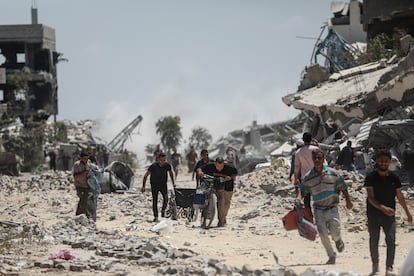The need to talk about forced displacement and advance solutions

Strictly opinion pieces that reflect the author's own style. These opinion pieces must be based on verified data and be respectful of individuals, even if their actions are criticized. All opinion pieces by individuals outside the EL PAÍS editorial team will include, after the last line, a byline—no matter how well-known—indicating the author's position, title, political affiliation (if applicable), or main occupation, or any that is or was related to the topic addressed.

The world's attention in recent weeks has been divided between different parts of the planet. All interconnected. And many share a rarely discussed common factor: the forced displacement of people .
As war and conflict escalate, even more worryingly in various corners of the world, Seville has also become a key epicenter : international leaders have gathered there to discuss financing for development . But development will not be possible if we do not first address the most urgent humanitarian needs.
Let me share some key points from the perspective of forced displacement.
Forced displacement continues to rise. Driven by increasingly complex crises, the latest global trends report from UNHCR, the UN refugee agency, estimates that, by the end of 2024, 123.2 million people worldwide were forcibly displaced. That is, 1 in 67 people on the planet is displaced, almost double the number a decade ago. Half of these are women and girls. If political solutions to conflicts are not achieved and diplomacy does not take the central role it deserves, this figure will continue to rise.
Forced displacement, in addition to the suffering it causes, has a significant economic impact. Conflict, one of the main drivers of displacement, exacerbates economic fragility by disrupting trade, breaking supply chains, and eroding human capital. These effects extend beyond borders, highlighting the urgent need for stronger international cooperation that facilitates inclusive policies to address vulnerabilities and foster the resilience and self-reliance of displaced people and their host communities.
Available resources are not keeping pace with needs. Despite significant efforts by host countries—given that 73% of the world's refugees live in low- and middle-income countries—funds to respond to displacement crises are insufficient; in fact, they are constantly decreasing. This gap, which often causes further instability, underscores the urgency of more effective spending that protects lives and a more equitable distribution of the collective responsibility to protect. Precisely for this reason, the international community adopted the Global Compact on Refugees in 2018, recognizing the need for a mechanism to ensure more predictable and sustained support for countries hosting refugees, with comprehensive responses that involve the whole of society.
Development aid is also essential to promote situations that favor the voluntary return of refugees.
Filippo Grandi, United Nations High Commissioner for Refugees.
Refugees and displaced persons are not a burden if appropriate policies are developed. By ensuring measures that support the effective integration of refugees in host countries, refugees can contribute significantly to economic growth and broaden the tax base, generating a net positive impact. A recent report by Deloitte and UNHCR estimates that Ukrainian refugees in Poland have contributed 2.7% of the national GDP. If their integration into the labor market were further facilitated, they could generate up to $680 million (€578 million) in tax revenue and social security contributions. Furthermore, a joint study by UNHCR and the World Bank indicates that if refugees were able to work on equal terms with nationals, up to $16 billion in annual savings in international assistance would be achieved, resources that could be reinvested to benefit host communities. Development aid is also essential to promote situations that encourage the voluntary return of refugees and enable them to contribute to the reconstruction of their countries.
Global partnerships are creating opportunities, but much remains to be done. In line with the Global Compact commitments, UNHCR continues to strengthen its collaboration with key development actors. Through a strategic partnership with the World Bank, it has boosted refugee inclusion and access to employment and services, mobilizing more than $5 billion in grants and concessional loans from the International Development Association (IDA), and nearly $1 billion through the Global Concessional Financing Facility (GCFF). These initiatives have unlocked an additional $7.7 billion in financing for middle-income countries hosting refugees since 2016. UNHCR also collaborates with the International Monetary Fund (IMF) to integrate macroeconomic analysis and data to support evidence-based public policies, with the aim of transforming displacement from a crisis into a shared development opportunity.
To achieve real impact, we must prioritize the following:
Inclusive policies. Inclusion not only benefits displaced people, it also strengthens social cohesion, stimulates local economies, and broadens the tax base. It also frees up limited international resources that can be reinvested in development.
Development cannot be built without building it on the only foundation capable of sustaining it in the long term: peace.
Filippo Grandi, United Nations High Commissioner for Refugees.
Support for host communities. Designing targeted aid that also reaches the most vulnerable members of host societies promotes more equitable growth and reduces social tensions, especially at a time when negative rhetoric against refugees is on the rise.
Sustained international support. It is essential to strengthen global partnerships that allow for the sharing of fiscal and social responsibilities for displacement, especially in fragile or conflict-affected regions, as well as in low- and middle-income economies.
Because there will only be true progress if it goes hand in hand with dignity, protection, and respect for the rights of all people, including those forced to flee their homes.
EL PAÍS




